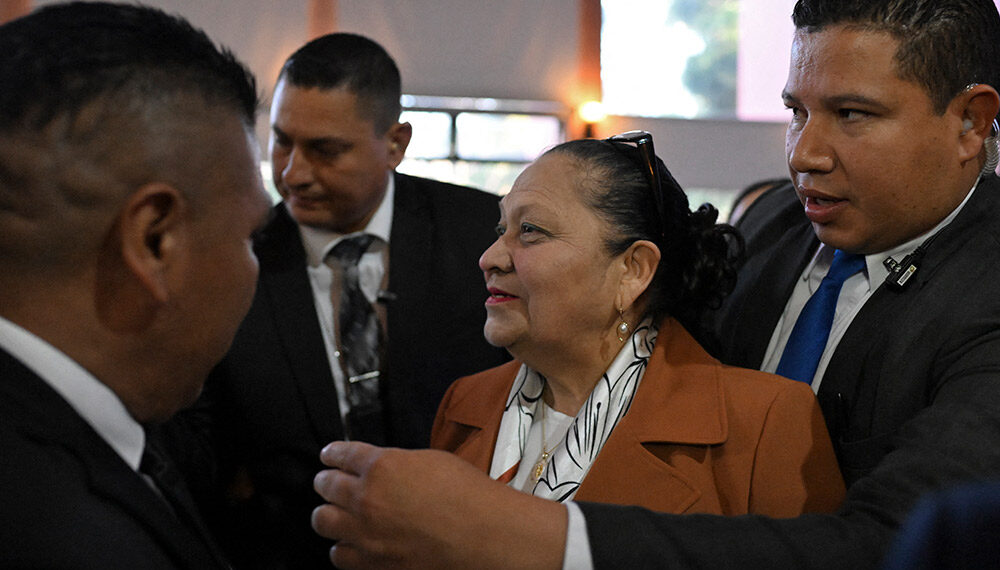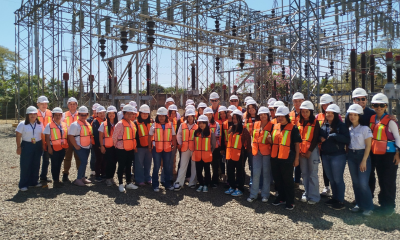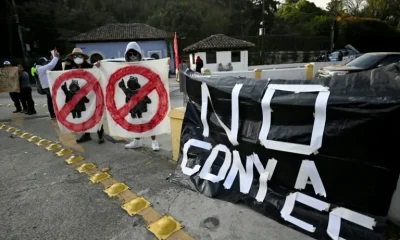Central America
Nicaragua detains four more opposition figures

AFP/Editor
Nicaraguan police said Sunday that they had detained four more opposition figures in a roundup ahead of November presidential elections in which four would-be challengers of long-serving leader Daniel Ortega have already been held.
Those arrested Sunday were top figures of the Unamos opposition party — its president Suyen Barahona Cuan, vice-president Hugo Torres, ex-guerilla Dora Maria Tellez and Ana Margarita Vigil Guardian, a police statement said.
It said the four were being investigated for “acts that undermine independence, sovereignty and self-determination, (and) inciting foreign interference in internal affairs,” among other crimes.
Unamos, formerly known as the Sandinista Renewal Movement (MRS), is made up largely of dissidents who split from Ortega’s Sandinista National Liberation Front (FSLN) because they disagreed with his leadership.
The charges stem from a law initiated by Ortega’s government and approved by parliament in December to defend Nicaragua’s “sovereignty,” which has been criticized by opponents and rights bodies as a means of freezing out challengers.
Julie Chung, the top US diplomat for Latin America, called the arrests “arbitrary” and denounced Ortega’s “campaign of terror” in a tweet.
“OAS (Organization of American States) members must send a clear signal this week: enough repression. The region cannot stand by and wait to see who is next,” she added.
Among the latest detainees, Tellez, 65, has in recent years been a vocal critic of Ortega, a former comrade-in-arms.
They fought together as guerillas against the dictatorship of Anastasio Somoza in the 1970s, and she later served as his health minister in the 1980s, before leaving in 1995 to co-found the MRS.
She was fiercely critical of the Ortega’s government clampdown on demonstrations that started in 2018 to demand his resignation, which according to rights groups claimed at least 328 lives.
Ortega governed Nicaragua from 1979 to 1990, returned to power in 2007 and has won two successive reelections since then.
Now 75, he is accused by the opposition and NGOs of increasing authoritarianism.
Ortega is widely expected to seek a fourth term in November elections, though he has not said so.
Since the beginning of the month, his forces have arrested about a dozen opposition figures, including four would-be presidential candidates, eliciting international condemnation and fresh US sanctions against Ortega allies.
Last month, Nicaragua’s legislature appointed a majority of governing party-aligned magistrates to the election body that will oversee the vote.
It has since disqualified two parties from participating.
Central America
Guatemala’s Attorney General Consuelo Porras Loses Bid for Constitutional Court Seat

Guatemala’s attorney general, Consuelo Porras, who has been sanctioned by the United States over corruption allegations, lost a key vote on Monday in which a public university selected two of the 10 magistrates for the country’s highest constitutional court. However, she could still seek a seat through another nominating body.
The election of five full magistrates and five alternates to the Corte de Constitucionalidad (CC) is taking place gradually over more than two months and is considered crucial in the ongoing struggle for control of Guatemala’s judiciary, which critics say has long been influenced by a political and economic elite accused of corruption.
According to results announced at a press conference, the governing council of the Universidad de San Carlos de Guatemala (USAC) rejected Porras, who had applied as either a full or alternate magistrate, and instead chose two candidates aligned with the university rector. The vote was held at a hotel in Antigua, about 35 kilometers from the capital.
Despite the setback, Porras — whose term as attorney general ends on May 16 — could still be nominated to the Constitutional Court by the Corte Suprema de Justicia, which appoints two magistrates. The remaining six are selected by the president, the bar association and Congress.
“It’s always a possibility,” the 72-year-old lawyer said days earlier when asked by reporters whether she would seek nomination through another institution if she lost the USAC vote.
Porras has been sanctioned by Washington and the European Union for allegedly attempting two years ago to block the inauguration of President Bernardo Arévalo and for pursuing legal actions against anti-corruption prosecutors, judges, journalists and social leaders since taking office in 2018.
The USAC vote was controversial because most members of the university’s governing council are serving beyond the expiration of their terms. Students, academics and social activists staged protests against Porras’ candidacy.
Central America
Teens visit ETESAL substation to learn about responsible energy use

Within the framework of World Energy Day, teenagers from the institutional care center Ciudad Niñez y Adolescencia (CNA), run by the Consejo Nacional de la Primera Infancia, Niñez y Adolescencia (Conapina), took part in an educational visit to a substation operated by Empresa Transmisora de El Salvador (ETESAL) in Santa Ana.
The aim of the activity was to give participants first-hand knowledge of how the country’s electricity transmission system works and to highlight the importance of responsible energy use.
During the tour, the group learned about the process that delivers electricity to homes, businesses, and industries. They were also introduced to specialized technical equipment and the safety measures required to ensure an efficient and reliable service.
Before the guided visit, the teenagers attended two informative talks and an environmental awareness session focused on the relevance of responsible energy consumption and its impact on the environment.
According to Nelson Menjívar, head of Conapina’s programs unit, the initiative serves a dual purpose. “It has two objectives: a recreational component and an educational one, so that adolescents can learn about the work carried out by ETESAL and how some of the resources they use at home are generated. This is in keeping with the guarantees established under the Crecer Juntos law; we ensure those rights for children,” he said.
Menjívar stressed that these activities help young people better understand how essential services function in their daily lives while promoting efficient consumption habits and a culture of environmental respect and care.
The event is part of the principle of shared responsibility set out in the Crecer Juntos law, promoted by the administration of Nayib Bukele, which states that families, society, private companies, and the State must work together to safeguard the comprehensive well-being of children and adolescents.
Central America
Guatemala’s president denounces MP raids during Constitutional Court election

The president of Guatemala, Bernardo Arévalo, on Thursday accused the Ministerio Público (MP) of interfering in the process to select magistrates for the country’s highest court, the Corte de Constitucionalidad (CC).
Arévalo has been locked in an ongoing dispute with Attorney General Consuelo Porras, who has been sanctioned by the United States and the European Union and labeled by critics as “corrupt” and “anti-democratic” after efforts to block the president from taking office two years ago.
Earlier on Thursday, the MP said it was investigating alleged irregularities in the voting process and carried out raids at polling sites set up at Club La Aurora and Parque Erick Barrondo, in Guatemala City, where the Colegio de Abogados y Notarios de Guatemala (CANG) was electing its principal and alternate representatives to the CC.
In posts on X, the president described the operation as a “spurious” action aimed at “interfering” in the election and “intimidating” voters in order to “alter” the outcome.
Voting was temporarily disrupted by the searches, the frisking of the CANG president, and a power outage caused by the explosion of a nearby transformer. Once the process resumed and concluded, the association elected Astrid Jeannette Lemus Rodríguez as one of the five members of the Constitutional Court, with Luis Fernando Bermejo Quiñónez chosen as her alternate.
“They failed in their attempt to hijack the elections (…). Honest lawyers won,” Arévalo wrote in a subsequent message.
-

 International4 days ago
International4 days agoHead-of-state diplomacy key to guiding China–U.S. ties, Beijing says
-

 International4 days ago
International4 days agoFlorida judge sets 2027 trial in Trump’s $10 billion lawsuit against BBC
-

 Central America2 days ago
Central America2 days agoGuatemala’s president denounces MP raids during Constitutional Court election
-

 International4 days ago
International4 days agoTrump administration to end special immigration operation in Minnesota
-

 Central America1 day ago
Central America1 day agoTeens visit ETESAL substation to learn about responsible energy use
-

 Central America4 hours ago
Central America4 hours agoGuatemala’s Attorney General Consuelo Porras Loses Bid for Constitutional Court Seat


























